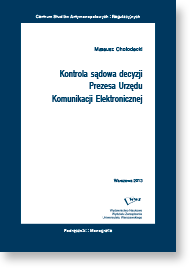Subject of this book is the model of judicial control of the decisions of the President of the Office of Electronic Communications (hereinafter the UKE President). This model is defined in the Telecommunications Law Act (hereinafter the TL) and provides two different judicial procedures against decisions of the UKE President. It is a general principle that the UKE President decisions are a subject to a judicial control exercised by administrative courts. However, some decisions enumerated in the TL (art. 206 section 2, 2a and 2b) are a subject of judicial review exercised by common courts [the Regional Court in Warsaw – the Court of Competition and Consumer Protection (hereinafter the SOKiK)]. Both types of judicial control differ from each other substantially. Therefore, the main goal of the dissertation was to present a model of judicial control of the decisions made by the UKE President together with an indication of the legal basis of this model. In addition, significant differences were determined in the way of judicial control by both types of courts, i.e. the administrative courts and common courts (SOKiK).
The studies conducted in the book indicated the following basic conclusions:
1. Based on the norms of international law and the Polish Constitution there is a guarantee of the right to a trial applies to all types of cases, and everyone is entitled to have an access to a court. This right to a trial can be achieved in two ways: by a judicial control based on the merits of the case (full review) or by a judicial control based on the legality (cassation model). Both of them are fundamentally different and have completely different aims. The aim of the first one is to independently review the case entirely, whereas the second one aims only to check of the correctness of the previous procedure.
2. Additionally, the right of access to a court in matters that belong to the UKE President has been defined in European Union law, namely the art. 4 Framework Directive (the right of appeal). This provision determines that the national law should specify: that there is an effective appeal mechanism, the merits of the case are duly taken into account, where the appeal body is not judicial in character, written reasons for its decision shall always be given, pending the outcome of the appeal, the decision of the national regulatory authority shall stand, unless interim measures are granted in accordance with national law. Furthermore, the appeal body must be independent of the parties involved, the appeal body shall have the appropriate expertise to enable it to carry out its functions effectively and where the appeal body is not judicial in character, its decision shall be subject to review by a court or tribunal within the meaning of the Treaty. It is important that the Framework Directive does not distinguish decisions within the competence of the national regulatory authority between those that are subjected to the right of appeal based on the art. 4 of the Framework Directive and other decisions. This means that the requirements of art. 4 of the Framework Directive apply to all decisions within the competence of the national regulatory authority.
3. The judicial control exercised by the administrative courts against the decisions of the UKE President is performed on the bases of the legality (model of cassation). The legislature also gave the jurisdiction to the common courts (SOKiK) to fulfil the right to a trial against the decisions of the UKE President (defined in art. 206 section 2, 2a and 2b TL). As a result, due to lodging of an appeal, common courts (SOKiK) settle the matter of the case from the beginning (full review).
4. Regarding the above model of judicial control of the decisions of the UKE President to the requirements of the Framework Directive it should be indicated that none of them fully realizes the requirements from the art. 4 of the Framework Directive (right of appeal). First of all, the administrative courts do not fulfil the requirement to control merits of the cases. Moreover, the administrative courts in its present form do not have an appropriate expertise required in the above-mentioned provision. On the other hand, the common courts (SOKiK) satisfy the condition to control merits of the cases. However, there is no normative basis for determining the SOKiK as a judicial body having a particular specialization in the category of cases.


